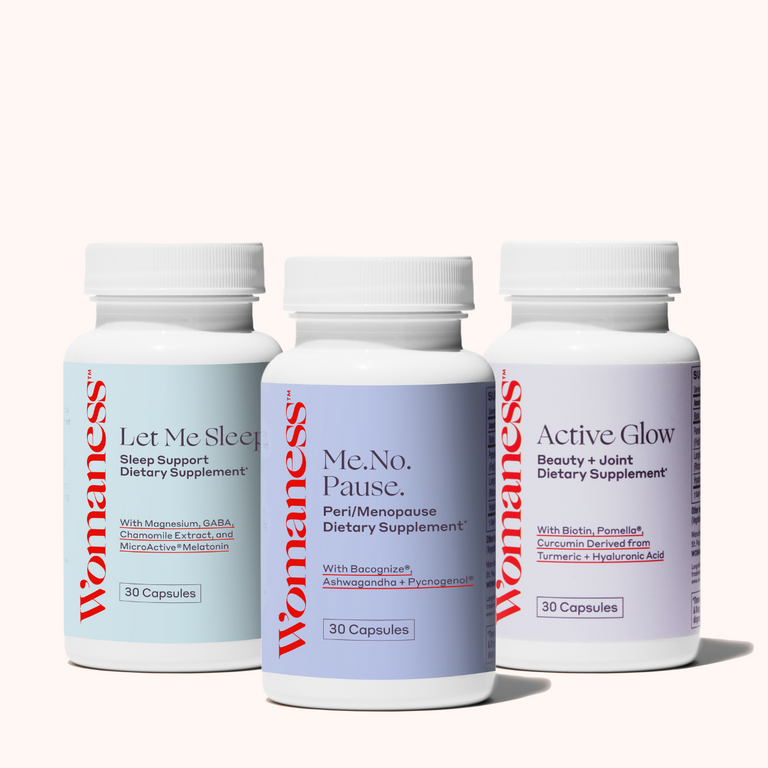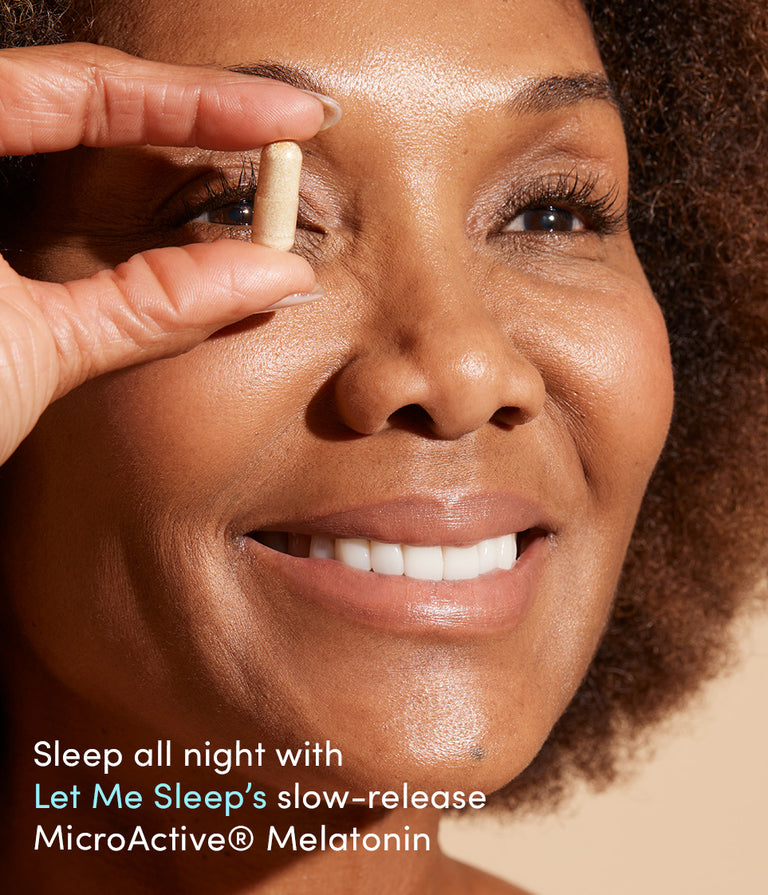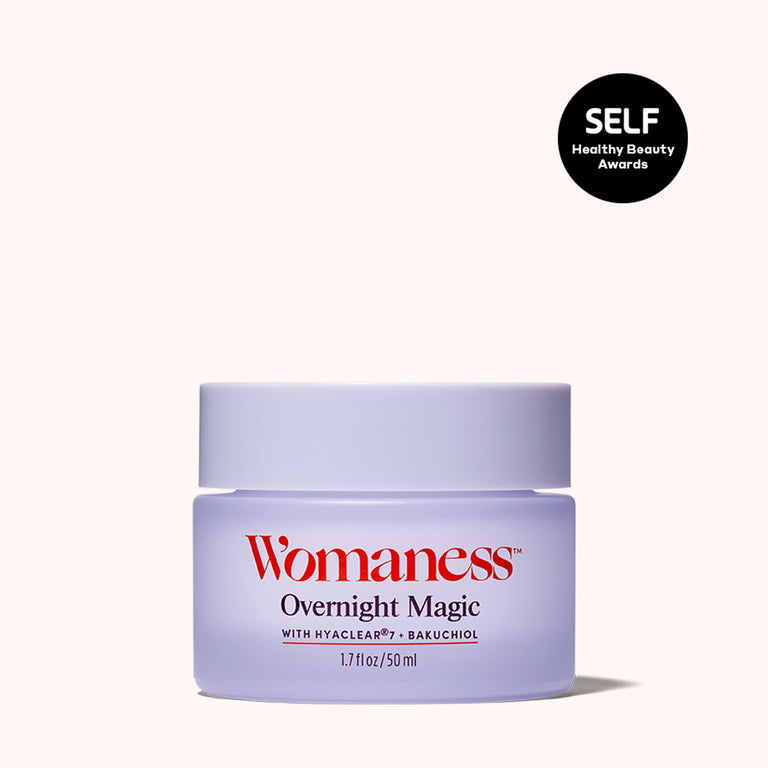By Womaness Editors 8-Minute Read
 First there are the night sweats and hot flashes. The brain that won’t turn off at 3 AM. Then your own loud snoring (um, when did that start?). Not to mention the heightened anxiety of balancing fluctuating hormones along with a family, a career, your household, relationships, and even aging parents. Sleeplessness and menopause make, well, uneasy bedfellows. But is it something you’ll be dealing with forever? Find out from our recent conversation with Dr. Shelby Harris, licensed clinical psychologist in behavioral sleep medicine and author of "The Women's Guide to Overcoming Insomnia," and get ready for some serious shuteye.
First there are the night sweats and hot flashes. The brain that won’t turn off at 3 AM. Then your own loud snoring (um, when did that start?). Not to mention the heightened anxiety of balancing fluctuating hormones along with a family, a career, your household, relationships, and even aging parents. Sleeplessness and menopause make, well, uneasy bedfellows. But is it something you’ll be dealing with forever? Find out from our recent conversation with Dr. Shelby Harris, licensed clinical psychologist in behavioral sleep medicine and author of "The Women's Guide to Overcoming Insomnia," and get ready for some serious shuteye.
1. You’re not imagining it: Disrupted sleep is part of both perimenopause and menopause.
Dr. Harris: “Many things are medical and hormonal, so hot flashes and night sweats often happen. Once you start to hit perimenopause, you have more risk of sleep apnea…things loosen and you snore. Plus women tend to have insomnia at a rate of three to two in comparison to men.
We women also often wake up with racing brains. There are more demands on us, especially in this stage of life. Perimenopause can start as early as the late thirties…so some women are going through these hormonal changes with kids at home while also taking care of their parents and working a job. It can be a firestorm.”
2. Alcohol can affect sleep (and night sweats).
“When you drink alcohol, it is relaxing for anxiety and stress (especially when there's been a pandemic on top of everything else). And some people use it to help them fall asleep. But alcohol will wear off, and guess what? You then have more awakenings, much more shallow sleep, or you tend to snore more, which affects your quality of sleep. We also do find that the more alcohol you have before bed, the more it can influence hot flashes and night sweats.
3. “As you age, you need less sleep” is a myth.
“Maybe you need a little less sleep—like a half-hour, as you tend to nap a bit more. Sleep gets lighter, but you don't adjust over time. You can't fake your body into being a six-hour-night sleeper when you might have been a seven- or eight-hour sleeper all along. People have a set need.”
4. How much sleep you need varies from person to person.
“The sweet spot for the majority of the population is anywhere between six to nine hours. That's where that common ‘eight hour’ recommendation comes from…it's simply in the middle. So if you're someone who gets six and a half-hours but feels well-rested most of the day, don't be bothered by it. Maybe you're just on the shorter end. You don’t have to try to get this ‘ideal’ of eight hours; you're only treating a number. For most people, it's really about those six to nine where you feel the quality is good, you feel refreshed to go about the majority of your day, and you have a dip here and there, which is normal.”
"When you wake up in the middle of the night, your rational brain is not there. It's literally not fully turned on."
5. Your brain isn’t rational at 3:00 AM—so get those racing thoughts out on paper.
“When you wake up in the middle of the night, your rational brain is not there. It's literally not fully turned on. If you tend to have the same thoughts over and over, write it down. Write, ‘There's nothing I can do’ (or write down what you can do about it) or just say, ‘I've already thought about it and I need to let it go.’
It’s also important to do a ‘brain dump’ beforehand. Spend 10, 20 minutes, even an hour before bed getting stuff out a piece of paper—because what you go to bed with on your brain is going to be there at three in the morning. If you put it on paper, it can help soften things in the middle of the night.”
6. Use your bed only for sleep and sex.
“If you are someone who wakes up at 3:00 AM with an active brain, the more you stay in bed tossing and turning, trying to force yourself to sleep or looking at your phone, without realizing it, you're teaching your body that the bed is a place to be awake. So if you only sleep and have sex in it, you teach your body that that is all the bed is for.
It’s not helpful to watch the clock if you can’t sleep. If you’re frustrated after about a half-hour, get up and go sit somewhere else. Or if you have trouble walking or take medications that make you groggy, sit up in bed and do something to pass the time, like reading, listening to music, or doing glow-in-the dark coloring books. And when you get sleepy, go back to sleep in your bed, not in other parts of your house, because then you're going to like sleeping there more than you do in your bed.”
7. Watch out for “sleep snacking.”
“It's important to get up at the same time and keep a consistent bedtime every day. For example, let's say you wake up at 7:00 AM. If you stay up from 7:00 AM until your bedtime—let's say 11:00 PM—and you don't take any naps, you're going to be good and ‘hungry’ for sleep at night. But if you take some naps or doze on the couch (especially in the evening or after dinner), you're ‘snacking’ on sleep. You then might be hungry enough to go to bed at 11:00 PM, but you're not going to be hungry enough for a full meal…and might wake up in the middle of the night. Essentially, snacking on sleep can interfere with your full appetite for sleep at night.
That being said, naps are great for some people. If you want to have a bit of a snack and it doesn't interfere with your dinner, then more power to you. I'm all for it. For the general population, 20 minutes is the sweet spot. Try to do it in your bed if you can. Set a timer for 30 minutes to give yourself a few minutes to fall asleep. After that, you should wake up…when you go longer, you often get into deeper stages of sleep and wake up groggier. And if you’re someone who goes to bed at 10 PM or 11 PM, the cutoff time for nap-taking is about 2:00 PM.”
"Get your phone out of the room at least a half-hour before bed."
8. Go old-school (or SUPER new-school) with your alarm.
“I always ask people what they use for an alarm. ‘My phone,’ they say. I don’t even know the number of people who have an actual old-school alarm clock!
You should get your phone out of the room at least a half-hour before bed. There's debate as to whether the blue light is so bad; I don't think it's great. There's a reason our insomnia rates have gone up, and it might be that blue light suppresses the melatonin your brain makes and keeps you up. But it’s also about what we’re looking at on phones. Social media is not always the most relaxing thing. Then you get a text…then an email. Those won’t help you wind down.
I'm a huge fan of the Hatch Restore alarm (and I don’t get paid by them at all!). You can set it to turn off at a certain time, and in the morning, it'll play music and get brighter and brighter, simulating the sun. It's really pretty next to the bed, too. It’s what I use for wind-down time.”
9. Remember that you can't “fake wake.”
“Sleep has several purposes, including helping with wakefulness during the day. If you have a bad night and drink some caffeine, it’s great, but it doesn't take away the background of sleepiness that's always there. You can feel like you're revved up to go, but you are tired. There's nothing better than natural sleep to give you that wakefulness you want. Nothing is going to give you the same kind of feeling.”
"There are so many different types of treatments now; you shouldn't suffer in silence.”
10. Disrupted sleep isn’t forever—and there are effective treatments.
“It's a misconception that you’re simply going to have poor sleep from this stage of life on out. Over the last few years, the education about perimenopause and menopause for the public and for physicians has skyrocketed. There are amazing books out there, so much evidence-based literature…
If you're really struggling, you need to address it. The first thing to do is talk with your gynecologist. If you're snoring or not sure if the quality of your sleep is great, see a sleep doctor for a sleep study. There are also non-medication treatments like Cognitive Behavior Therapy for insomnia. There are so many different types of treatments now; you shouldn't suffer in silence.”
GET MORE FROM DR. HARRIS
More Menopause 101
What's Happening Here? Sleep Issues & Insomnia
What's Happening Here? Hot Flashes
Top Menopause Reads From an R.N.




